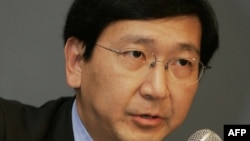A months-long struggle to fill a senior position at the University of Hong Kong (HKU) has become a focal point for critics who say it shows that Beijing is trying to expand its political influence in a territory that has long enjoyed greater autonomy.
In December, the university’s search committee unanimously recognized Johannes Chan, a professor and former law school dean, as its choice to become deputy head of the school.
This week, after a nine-month delay, the university’s council rejected Chan’s nomination as one of its five pro-vice chancellors (PVC) in a confidential 12-8 vote without explanation. The council includes students and university employees but its largest group is composed of members from outside the school, including several picked by the territory’s pro-Beijing chief executive.
Unprecedented rejection
Never in the university’s history has a search committee’s nomination been rejected. The day after the vote, the student union president, who sat in the council meeting, showed that Chan was rejected for relatively irrelevant reasons such as he does not have a Ph.D. and his appointment would cause “a further division of the university.”
Chan is a highly-renowned rights lawyer and pro-democracy scholar and has ties with another law professor Benny Tsai, one of the main backers of the pro-democracy Occupy Central movement.
Supporters say that made him unacceptable to Beijing, which used its influence on the university council to vote him down.
“I think it highlights the fact that Xi Jinping was very intolerant of the so-called root of the liberal forces. He’s very determined to root out those courageous voices in the civil society not only in mainland China, but also in Hong Kong,” said Dixon Sing, associate professor of the Hong Kong University of Science and Technology's social science division.
Universities have fed the pro-democracy movement in Hong Kong
Universities with liberal-minded scholars have long been the foundation of Hong Kong’s pro-democracy forces. HKU, the top-rated college in Hong Kong, has graduated some of the territory’s most prominent political figures including Sun Yet-sen, former colonial Governor Lord Wilson of Tillyorn and Martin Lee, founding chairman of the Democratic Party in Hong Kong.
Critics say the school’s pro vice chancellor position is too powerful for Beijing to allow to slip away.
Nevertheless, observers say Beijing has sent a serious warning to other academics.
“For any academic [members], particularly those who are in the administrative level, if they either directly or indirectly support a pro-democracy movement, they may be in trouble in terms of their career Sing adds.
Others worry that such overt politicization could taint the territory’s international academic reputation.
Worrisome trend
Global tertiary education expert Jamil Salmi says that, if Chan was rejected for reasons that have nothing to do with his competence and qualifications, it will be a cause for worries.
“Right now, Hong Kong has a world-class university system, changing the governance would represent a threat to that high-level performance,” said Salmi, author of the World Bank’s report entitled The Challenge of Establishing World-class Universities.
The expert argued that, in lieu of institutional autonomy, the university could start to have recruitments and selection of leaders, not based on professional merits and competence, but political criteria.
Bryane Michael, a senior fellow at both the HKU’s Law Faculty and the University of Oxford, says Chan’s controversy was created by the system, which pitched two forces against each other: the politicians against the academia.
He traces the root of the problem to the Hong Kong University Ordinance from 1911. The law gives politically connected individuals seats on the governing councils of universities, empowering them to decide how universities should be run.
“The university shouldn’t be governed by this old law from 1911. It should be independent from the government. It should govern itself. That way, there’s no controversy,” says Bryane Michael, a senior fellow at both the HKU’s Law Faculty and the University of Oxford.






